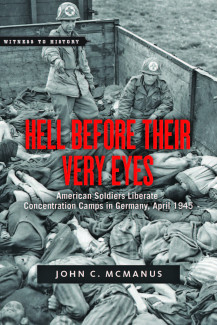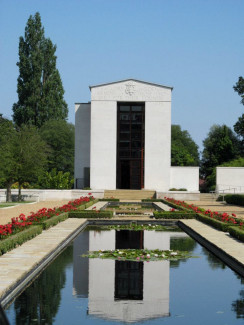
Johns Hopkins UniversityEst. 1876
America’s First Research University
Now Browsing:
Walking hand and hand with the men and women who served
By Kathryn R. Marguy, JHUP Staff

On May 8, 2015, the seventieth anniversary of VE Day, thousands gathered at Horse Guards Parade in London to commemorate the end of World War II in Europe. A stage in the likeness of an aircraft hangar played host to hours of 1940s-themed performances. The bells from hundreds of England’s churches rang out in celebration, and dignitaries placed ceremonial wreaths to pay homage to those lost in battle. In the midst of these festivities, the imminent release of John C. McManus’ book, Hell Before Their Very Eyes, becomes all the more poignant.
Like the relatable, vivid prose of Eli Wiesel and the masterful research of Studs Terkel, McManus’ work expertly captures the experiences of American soldiers as they liberated Nazi concentration camps in the spring of 1945. There, they uncovered unspeakable horrors that would shock the world. Many of the soldiers who stormed the gates of these sites were young men, and no amount of military training could prepare them for the ghastly visions that lay ahead.
As an editorial assistant here at Johns Hopkins University Press, I’ve had the privilege of working on several first-rate history books, but McManus’ project holds particular resonance for me. In the summer of 2012, I studied World War II history at St. Edmund’s College at Cambridge. What struck me during my experience was the way the British people remembered the “Good War.” The gruesome hardships of the 1940s are woven into the tapestry of their everyday lives. The reminders are inescapable, from the perfectly preserved corridors of the Churchill War Rooms to The Eagle, a small pub in Cambridge where the walls and ceilings are covered with the names of RAF airmen who would stop in for a pint.
The experience left me ashamed of my textbook knowledge about the war. Dates, names, and treaties I’d come to know through my studies suddenly felt stale when compared to the visceral connection most Europeans my age have. With the same familiarity my American classmates showed discussing Martin Luther King’s “I Have a Dream” speech or the Kennedy assassination, my British counterparts would discuss World War II. Many of my colleagues had a personal connection to someone involved in the war. I envied their closeness to this fascinating time in history. It wasn’t until I visited places like the Ely Cathedral’s war memorial, stroked the keys of an original Enigma machine, and walked the narrow halls of the H.M.S. Belfast that it became real. Americans liberated the concentration camps on April 4, 1945, but without a physical link to these events, it is very easy to become distanced from the realities of this war.
Reading Hell Before Their Very Eyes is like walking hand and hand with the men and women who served—every word another step forward, every chapter a vivid diorama of war torn camps. And once the last page has turned, you will feel as if you were there, another brother or sister in arms, fighting for the future.
Kathryn R. Marguy joined the JHU Press staff as an editorial assistant in 2014.

Login to View & Leave Comments
Login to View & Leave Comments


